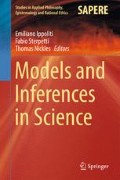Abstract
The paper provides a presentation and motivation of the concept of non-empirical theory confirmation. Non-empirical theory confirmation is argued to play an important role in the scientific process that has not been adequately acknowledged so far. Its formalization within a Bayesian framework demonstrates that non-empirical confirmation does have the essential structural characteristics of theory confirmation.
Access this chapter
Tax calculation will be finalised at checkout
Purchases are for personal use only
Notes
- 1.
For an instructive philosophical perspective on historical sciences, see Turner (2007).
- 2.
- 3.
The presentation of this section is largely taken from Dawid et al. (2015).
- 4.
For the purpose of our argument, it is not necessary to assign a precise operational meaning to the various levels of \(S\). It is sufficient that they satisfy a natural monotonicity assumption with regard to their impact on \(F_{A}\)—see condition A3.
References
Bovens, L., Hartmann, S.: Bayesian epistemology. Oxford University Press, Oxford (2003)
Dawid, R.: Underdetermination and theory succession from the perspective of string theory. Philos. Sci. 73, 298–322 (2006)
Dawid, R.: String theory and the scientific method. Cambridge University Press, Cambridge (2013)
Dawid, R., Hartmann, S., Sprenger, J.: The no alternatives argument. Brit. J. Philos. Sci. 66(1), 213–234 (2015)
Howson, C., Urbach, P.: Scientific reasoning: the Bayesian approach, 3rd edn. Open Court, La Salle (2006)
Strominger, A., Vafa, C.: Microscopic origin of the Bekenstein Hawking entropy. Phyiscs lett. B379, 99–104 (2006)
Turner, D.: Making prehistory: historical science and the scientific realism debate. Cambridge University Press, Cambridge (2007)
Author information
Authors and Affiliations
Corresponding author
Editor information
Editors and Affiliations
Rights and permissions
Copyright information
© 2016 Springer International Publishing Switzerland
About this chapter
Cite this chapter
Dawid, R. (2016). Modelling Non-empirical Confirmation. In: Ippoliti, E., Sterpetti, F., Nickles, T. (eds) Models and Inferences in Science. Studies in Applied Philosophy, Epistemology and Rational Ethics, vol 25. Springer, Cham. https://doi.org/10.1007/978-3-319-28163-6_11
Download citation
DOI: https://doi.org/10.1007/978-3-319-28163-6_11
Published:
Publisher Name: Springer, Cham
Print ISBN: 978-3-319-28162-9
Online ISBN: 978-3-319-28163-6
eBook Packages: Religion and PhilosophyPhilosophy and Religion (R0)

